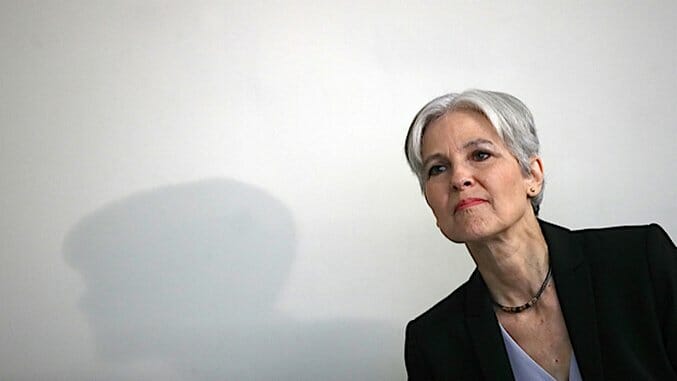Jill Stein is Terrible for Environmentalists
Photo by Win McNamee/Getty
Jill Stein is terrible for environmentalists. And I want to make it clear that I don’t think it’s intentional on her part, or that she doesn’t care about the environment—she definitely does. Her platform easily takes the most pro-environment stance of any of the four relevant political parties this election. Some might even say it’s ludicrously pro-environment, but that’s neither here nor there. The point is, she really does seem to care about green issues, and we can reasonably assume that if she were elected president, nature would be a lot better off for it.
The thing is that she will never, ever, ever be president. But again, I’m not really criticizing her for that, because that’s not her fault either. If there has ever been a national political party anywhere that jumped from earning less than one percent of the vote in one election to winning it all just four years later, I certainly haven’t heard of it. And hey, Jill actually is polling much better than she did in 2012, currently averaging around three percent, which could be a good sign that the Green party and the environmental movement it represents may actually be moving toward national significance.
Except: No, because Jill Stein is terrible for environmentalists.
See, while Jill Stein definitely does care for the environment, it doesn’t really seem like her top priority. Instead, Jill’s top priority is apparently getting people to pay attention to her. And hey, for a minor political party often ignored by a media hostile to anything other than the main event, this alone isn’t that much of a sin. After all, who’s going to vote for a party they’ve never heard of? The problem is that Jill doesn’t seem to discern between positive and negative coverage.
Take, for instance, Jill’s pick for Vice President. Ajamu Baraka is a self described radical, and radical he is. For one thing, Ajamu is big on unpopular conspiracy theories—he’s the hipster of the tinfoil hat set. Example: He believes that the shooting down of MH-17 passenger jet over Ukraine was a Western false flag operation, apparently based on something said on RT one time.
He’s also skeptical of the reports on Boko Haram’s kidnapping of young girls. Not that he doesn’t believe it happened, just that the numbers are probably exaggerated. Is this a good time to mention that his writing has also appeared in the work of a holocaust denier? Sure, he later disavowed the book and claimed he was unaware of the author’s views, which is actually believable—Ajamu certainly doesn’t seem to be one for researching things.
He’s also big on saying outlandish and terrible things, like the time he called Barrack Obama America’s “Uncle Tom president,” or when he called a vigil for the victims of the Charlie Hebdo massacre a “white power march.” In fact Ajamu, seems to have a thing about throwing around accusations of white power, managing to link Beyonce, Bernie Sanders, and Barack Obama to the “normalization of white supremacy.” To put it mildly, Ajamu can be a bit much.
But hey, that’s just her VP pick, and we all know how tough those can be. At the very least, he’s not a religious nut like Mike Pence or suburban-dad boring like Tim Kaine. It’s not like Jill dabbles in absurd conspiracy theories or makes wild and outrageous statements right? Well, kind of. Kind of a lot.
For starters, while Jill might not go as far as to openly question the generally accepted version of major news stories, she does like to leave the door open for any conspiracy nuts that might want to warm themselves by the Green party’s carbon neutral dumpster fire. Jill doesn’t actually say that Wi-Fi is causing cancer and harming our children, for instance, but that we “make guinea pigs out of whole populations and then we discover how many die.” Seems like a rather extreme accusation, right?
And as a medical professional, she would certainly never claim that vaccines cause autism, but she does manage to imply the conclusion when she says that there are some “real questions” there. The problem here is that in both cases, there has already been extensive research that confirms that no, vaccines do not cause autism, and no, wi-fi is not harmful to children or anyone else. But hey, it’s good to ask questions, even if you already have the answers.
And besides, it’s not like Jill is the only politician in the race who’s fond of conspiracy theories. The Trump campaign seems to find a new one to latch onto on a monthly basis, whether it’s that Hilary Clinton is barely alive or that Ted Cruz’s father helped kill JFK. But the problem for Jill (and all of us, really) is that Trump’s name is on a major ticket. He doesn’t have to worry about gaining mainstream acceptance—he already has it. As the GOP nominee, Trump is likely looking at a floor of 40 percent of the vote even if he does nothing but pander to the crazy crowd between now and November.
-

-

-

-

-

-

-

-

-

-

-

-

-

-

-

-

-

-

-

-

-

-

-

-

-

-

-

-

-

-

-

-

-

-

-

-

-

-

-

-








































